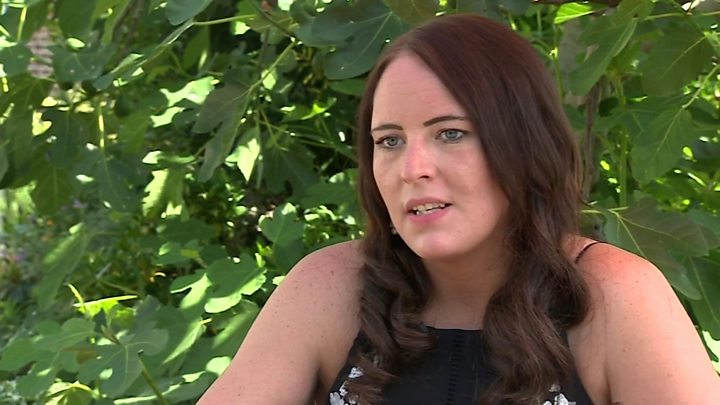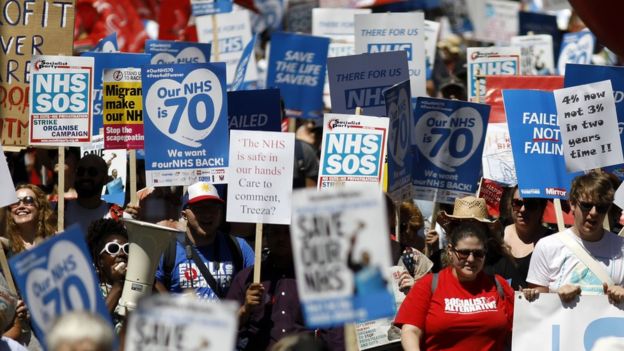News
NHS funding to focus on cancer and mental health
With vacancies for up to 100,000 doctors and nurses, recruitment will be key to improving outcomes, NHS England's head warns.
The NHS needs to recruit thousands of new doctors and nurses to help deliver its ambition of delivering improved cancer care and mental health provision, the chief executive of NHS England has told Sky News.
There are vacancies for up to 100,000 doctors and nurses across the NHS, undermining attempts to hit waiting time targets.
The staff shortages raise questions about whether it is possible to deliver genuine improvements in outcomes as well as recover waiting times, even with a funding deal worth up to £20bn a year announced last month by the prime minister.
NHS England to stop 'ineffective' treatments
Tonsils removal, breast reductions and snoring surgery will be offered to far fewer patients from next year, under plans being drawn up by NHS England.
Officials are to discuss proposals to stop or reduce 17 routine procedures deemed to be "ineffective or risky".
The treatment will be offered only if it is judged to be of "compelling" benefit and there are no alternatives.
NHS England said the move would affect about 100,000 people every year and free up an estimated £200m.
The British Society for Surgery of the Hand (BSSH) said cutting back on certain procedures would cost the economy more as people would be unable to work without surgery.
Patients at risk of serious harm from their condition will continue to be offered treatment.
It follows reviews last year to save £190m from supplying over-the-counter medications and treatments described as "low value".
- NHS plans to cut homeopathy treatments
- NHS plan: What we still need to know
- Theresa May unveils £20bn boost for NHS
The announcement comes as thousands of people gathered in central London to mark the 70th anniversary of the NHS and demonstrate against cuts to the health service.
Organisers of the rally, which include the People's Assembly - which campaigns against austerity cuts - and unions, are calling for more money for the NHS.

NHS England says for most of the 17 procedures under consideration, alternative treatments including physiotherapy, a minor injection or change of diet are likely to be effective.
It says the savings made by not carrying out the procedures will be reinvested in better frontline cancer, mental health and other critical services.
Its national medical director, Prof Stephen Powis, said: "If we want the very best clinical care for our patients, we need to stop putting them through treatments where risks and harms outweigh the benefits.
"By reducing unnecessary or risky procedures for some patients we can get better outcomes while reducing waste and targeting resource to where it is most needed."
The plans have the backing of health professionals and the National Institute for Health and Care Excellence, which advises on the clinical benefits and cost-effectiveness of treatments.
Which treatments will be affected?
It is proposed four treatments will be offered only when a patient makes an individual request.
These include surgery for snoring, where there is said to be only limited clinical evidence of effectiveness and which poses significant risks to patients.
The others are: dilatation and curettage for heavy menstrual bleeding, knee arthroscopies for osteoarthritis and injections for non-specific back pain.
A further 13 procedures will only to be offered when specific criteria are met:
- Breast reduction
- Removal of benign skin lesions
- Grommets for Glue Ear
- Tonsillectomy for sore throats
- Haemorrhoid surgery
- Hysterectomy for heavy menstrual bleeding
- Chalazia (lesions on eyelids) removal
- Removal of bone spurs for shoulder pain
- Carpal tunnel syndrome release
- Dupuytren's contracture release for tightening of fingers
- Ganglion excision - removal of noncancerous lumps on the wrist or hand
- Trigger finger release
- Varicose vein surgery
NHS England plans to consult publicly on the proposals between 4 July and 28 September, with changes planned to start in 2019-20.
What do patients say?
Some have criticised the plans.
Samantha Lilley, 29, was born with a rare genetic condition called epidermal nevus syndrome, which causes skin lesions.
Throughout her life she has had procedures to help the physical and mental suffering but is worried about whether those would be discontinued.
She said: "They're not life threatening, but they're painful and unsightly, to leave them would be detrimental to my health."
She added: "My condition is lifelong. Is this what the NHS is now - that you must be at death's door to receive treatment? This isn't what it was created for - its purpose was to improve the quality of life of British citizens."
